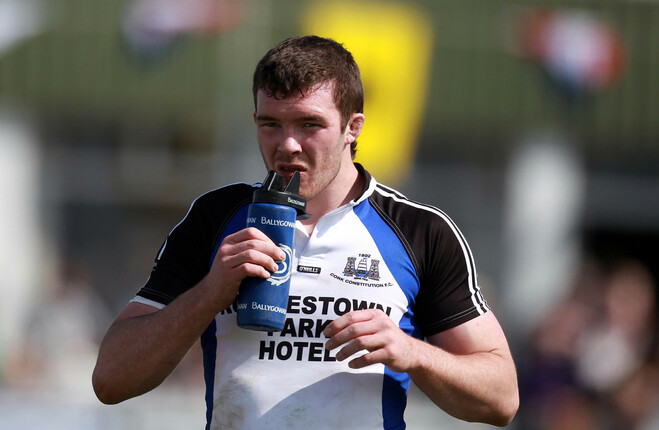PETER O’MAHONY WAS a week into college in 2008 when he came through the front door of the family home in Mount Oval, flung his bag on the floor and announced that he’d had enough.
“Nah, I’m not going to stick this at all,” he announced. “I’m just going to play rugby for the rest of my life.”
His brother Mark, then 15, laughed in his face, dumbfounded by the delusions of the O’Mahony’s eldest son.
These days, Mark laughs only at the extent to which he underestimated his older brother.
In Mark’s defence, ‘Pete’ was always a few steps ahead. When his father, John, brought him up to Temple Hill for his first ever rugby training session at U5 grade, Cork Con took the safety precaution of moving Peter up as far as the U8s.
The writing was on the wall early. The pictures soon followed.
Encounters with Munster and Ireland stars were par for the course up in Con, around whose grounds O’Mahony would have become familiar with figures such as Donal Lenihan, Ronan O’Gara, Peter Stringer and Donncha O’Callaghan. In a neat piece of foreshadowing, he even used to cut neighbour Frankie Sheahan’s grass.
And so O’Mahony’s childhood bedroom would instead become adorned by framed photographs of his meeting giants from the southern hemisphere. A couple of snaps with Jonah Lomu and Francois Pienaar were especially cherished.
Seven or eight years ago, his mother Caroline unearthed a piece of Peter’s homework that he had done when he was a second-year student at Presentation Brothers College. Scrawled on this A4 sheet was a letter-association exercise in which a 14-year-old Peter had been tasked with writing a short paragraph for every letter of the alphabet. Virtually all of his answers were directly connected to his favourite sport.
At the bottom of the sheet was a piece of feedback from his teacher: “Obviously rugby is huge in your life. Maybe someday you’ll get to wear the Munster jersey or even the Ireland jersey if you’re lucky enough.”
But O’Mahony would have told you even back then that fortune has very little to do with it.
A year after submitting that homework, O’Mahony was running lineout drills for his school teammates between their Junior Cert exams.
The schools rugby season had finished three months earlier — and four earlier for O’Mahony’s team, whose Junior Cup campaign never got going. They weren’t scheduled to pick up another ball until they returned to school in September.
But the following school year’s Bowen Shield would be the first competition in which lifting would be permitted in the lineout.
O’Mahony had played most of his Junior cycle rugby in his preferred position of out-half, forming a half-fruitful 10-12 axis with longtime friend Simon Zebo. He had been switched to the second row only shortly before the Junior Cup as a means of channeling his temper.
As such, he had work to do. And if he did, so did the rest of his pack.
Some of O’Mahony’s fellow forwards recall his new lineout regime as consisting of as many as three sessions per week. There is universal agreement, however, that the drills continued from the Junior Cert all the way through the summer holidays.
O’Mahony’s Pres team which had achieved little in its first three years began its senior cycle by reaching the Bowen Shield shield final, where they were beaten by cross-city rivals Christians.
O’Mahony and co. reversed that defeat a year later, when it really mattered: in the Senior Cup final.
In that 13-3 victory at Musgrave Park, fifth year Zebo scored one of the most breathtaking solo tries in the competition’s history before classmate O’Mahony took out two CBC defenders and popped an audacious offload to the pair’s lifelong mutual friend, Peter Kelleher, for the insurance score.
Footage of schools rugby was far more sparse back in those days but word of O’Mahony’s aptitude spread by mouth, even as far as The Pale. He hadn’t yet left secondary school by the time Brent Pope earmarked him as a future national-team captain during an RTÉ build-up segment in 2008.
Munster knew well that they had a generational player on their hands. They fast-tracked O’Mahony through their academy. He made his debut against Ulster in January 2010.
It was as early as the 2011/12 campaign when the Rochestown man was drafted into the province’s leadership group alongside Ronan O’Gara, Paul O’Connell and Doug Howlett. He was 22.
Imagine telling O’Mahony back then, while he rubbed off the very shoulders upon which Munster Rugby built its modern-day image, that it would be 12 years before he raised another club trophy. Your ears would still be ringing.
When Munster ended that drought in Cape Town last May, O’Mahony’s visible recoil as an ecstatic John Hodnett dropped an F-bomb seconds into their shared post-match interview was doubly funny for the fact that so many of O’Mahony’s own iconic moments have involved coarse language.
Few players who have come into his orbit over the years have escaped a Peter O’Mahony tongue-lashing, so many examples of which have entered the public record via ref mic.
Privately, too, his feedback for teammates could be most unparliamentary, especially during his younger years.
One of his most famous bollockings in Munster circles was delivered during a Monday-morning video review following a woeful 24-7 defeat to Leinster at Thomond Park in December 2015.
The 26-year-old O’Mahony, who had already been Munster captain for two and a half years, was entrusted by head coach Anthony Foley to lead the meeting having watched the game from the stand — he was still rehabbing his knee after rupturing his ACL at the World Cup two months earlier.
Crutches were pointed that day. O’Mahony first took aim at Kiwi recruit Tyler Bleyendaal or, as the skipper referred to him, “a 10 that can’t kick the fucking ball.”
So visceral was O’Mahony’s assessment of Bleyendaal’s performance that the out-half was left visibly close to tears.
Sensing the discomfort in the room as Bleyendaal — who had made his first-team debut only three months prior — shrunk into himself, O’Mahony pivoted to a more cocksure teammate and went in even harder.
Among other things, Simon Zebo was labelled “a British and Irish Lion and Ireland international that can’t fucking defend.”
Zebo, furious, fired back at his childhood friend, but both he and Bleyendaal were dropped for Munster’s 9-7 victory over Ulster at Ravenhill the following weekend.
In a team environment, these kinds of earth-scorching tirades are tolerable only when there is substance to the person delivering them. Zebo and Bleyendaal would come to understand that O’Mahony’s criticisms were not really about them at all: he had singled out Axel Foley’s fledgling pet project and his own teammate of 15-odd years as a means of communicating to Munster’s wider squad that the standards were uniform. Either pitch up or piss off.
Since he was a child, O’Mahony’s sole concern in a rugby context has always been the collective. He considers it among his primary roles to defend that collective at all costs.
He was massive behind the scenes for Munster the week of Axel Foley’s death in October 2016, even if it had hit him harder than virtually anyone else in the building.
A day after Axel’s funeral, during the early throes of Glasgow’s visit to Thomond, O’Mahony and his Warriors counterpart, Jonny Gray, were summoned together by referee Jerome Garces who called for calm after a bout of handbags.
Gray was quick to plead his case to Garces that Munster were “too emotional”.
Right under Garces’ nose, O’Mahony shoved Gray in the chest. “Don’t fucking tell us what emotions we should have!”
Donncha O’Callaghan would later write in his Times column that the Glasgow game was “the day we all saw our little brother grow up”.
Indeed, O’Mahony had first become a father just a few months earlier. That new role, and an increased duty to a team still reeling from the loss of their head coach, demanded that he become more emotionally intelligent.
Seven years later, O’Mahony’s role in his provincial and national-team dressing rooms is almost parental.
He’ll miss Munster’s review this Monday of their disappointing defeat to Northampton as he joins up with Ireland in Dublin. In normal circumstances, there still would have been a few bollockings dished out but there equally would have been words of encouragement and, where required, an arm lent to sore shoulders.
There will surely already have been some slagging thrown in his direction, too, after he briefly forgot he was no longer Munster’s captain in a comical exchange with referee Tual Trainini on Saturday night. That one will have been put down to old age.
O’Mahony himself never believed that he’d still be playing rugby deep into his 30s. He had two shoulder reconstruction surgeries in 2014 and did his ACL a year later. He has been managing back pain off the field for years. More often than not, he plays hurt.
In his mid-20s, he turned down a couple of approaches by Toulon and one by Toulouse, all of which would have seen his salary almost doubled.
His line of thinking at the time was that, even if he wanted to go, the Top 14 schedule would force him into retirement by 28 or 29.
But he also plainly didn’t want to go. The whole point of conducting himself like a professional rugby player from the Junior Cert onwards had been to represent both his province and country.
When O’Mahony describes his newly bestowed Ireland captaincy as a dream come true, he’s not just saying it. This is an accolade of which he has dreamt since he first picked up a ball in Temple Hill in 1995.
Few players buy further into the honour of representing your country in sport than O’Mahony. He truly sees this Ireland team as an extension of the very people who fill stadiums, watch them on TV or even casually check their phones for a result when they wake up thousands of miles from home.
He loves the reality that, when he’s in Ireland camp, he can temporarily leave behind the insularity of provincial focus and enjoy the company of Munster’s competition. Among his closest friends even outside of rugby, for example, are Leinster legends Johnny Sexton, Seán O’Brien and Jack McGrath.
He embraced even his bench role with Ireland a couple of years ago, during which he remained enormously helpful even to the back rows who started ahead of him.
Far more often than not, O’Mahony has risen to the occasion for his national team. And it is in this arena that he has made his name, forging all kinds of reputations depending on who you ask.
Fans of England, Wales and Scotland will call him every name under the sun, while players from those countries who have either toured alongside O’Mahony with the Lions or spent time in his presence could scarcely speak more highly of him.
Something close to the reverse is true in New Zealand, whose rugby public reveres him but whose players will have enjoyed few things more than dumping him out of the World Cup three months ago.
But perhaps the most pertinent testament to O’Mahony is that in Cork and Ireland, he has become a figure cherished even by those who make a point of loathing the sport in which he competes.
There is an element of farce to the fact that his future in Irish rugby remains uncertain beyond the summer. But Peter O’Mahony won’t be consigned to the past easily. He is a deserving Ireland captain for the present.


